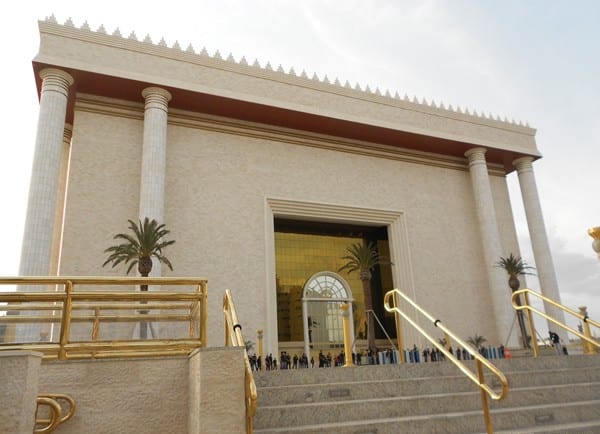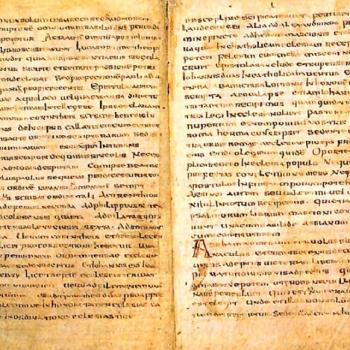vs. Dr. Steven DiMattei

Dr. Steven DiMattei is a biblical scholar and author, formally trained in the New Testament and early Christianity, with M.A degrees in Classics and Comparative Literature as well. Rumor has it that he is an atheist, but I haven’t been able to confirm that on his site. He put up a website called Contradictions in the Bible. It seems inactive now (or he has lost interest or moved onto other things: who knows?), but the themes are things I really enjoy discussing and debating, and his articles are still online for all to see; thus fair game for critique — and stimulating food for thought, too. There is almost nothing I like to discuss and think about more than the interpretation of the Bible. Steven wrote in a post dated 5-7-16:
One of my reasons in choosing the word “defend” to describe my aims as a biblical scholar and author was in part to attract Christian apologists to my work and hopefully to get them to read these ancient texts on their terms and from within their own cultural contexts and to create a conversation around the biblical texts, their authors, and their competing beliefs, messages, worldviews, theologies, etc. As you can imagine this has proven quite difficult, nay impossible. Many Christian apologists and fundamentalists just cannot read, or simply identify, the text on its own terms separate from the beliefs and assumptions about the text handed-down through this collection of ancient literature’s title, “the Holy Book.”
Here I am: an apologist quite willing to engage in conversation. It takes two. So we’ll see if Steven is willing to follow through on his stated desire. I have had my own long history (in almost 40 years of apologetics) of “difficult, nay impossible” attempts to discuss matters with many people who tend to be of a few particular belief-systems, though I have no problem talking with anyone who is civil and can stick to a topic. I don’t just say this, I have a demonstrable record of doing it, which is evident on my blog, with its 1000+ dialogues. But as I said, dialogue takes two, and I would add that it also requires a degree of at least minimal mutual respect. Steven’s words will be in blue.
*****
I am critiquing Steven’s article: #151. Does Yahweh dwell among the people, in the Temple OR not? (Ex 25:8, 29:45 vs Deut 12:11, 12:21; Acts 7:48) (5-31-13).
The fundamental reply to this is what I have stated in my second of now four replies to Steven’s reasoning:
I think his fundamental fallacy, spread throughout these articles and many others, is thinking in “either/or” (hyper-rationalistic) terms, as opposed to the “both/and” outlook, which typifies the biblical and ancient Hebrew outlook. We shall see how this is a wrong path and frequent source of confusion in his arguments, and indeed, massively in scores of arguments about alleged biblical contradictions from all sorts of biblical skeptics (I’ve refuted these errors in particulars scores of times, myself).
Steven, playing his usual documentary theory game, attempts to argue that there are contradictory motifs in Scripture: God present in heaven and God present in His temple:
One or the central and most important theological tenets of the Priestly theocracy was that Yahweh dwelt among the people, tented in the Tabernacle which was at the center of their camp. . . .
This whole priestly and cultic ideology is completely absent in the Deuteronomic literature. The main reason being that the Deuteronomic scribes—who were non-Aaronid Levites (see #152)—have vastly different ideas about what religion is. The cult played a minor role, if any, in the Deuteronomic literature. But beyond this, the Deuteronomists would have vehemently disagreed with the Priestly writer’s ideology that Yahweh dwelt among the people.
For the Deuteronomist, Yahweh dwelt in heaven. To preserve the holiness of the Temple dwelling, the Deuteronomist claimed that merely Yahweh’s name resided there, not his glory nor presence as the Priestly writer: “the place that Yahweh, your god, will choose to tent his name.”
In fact, both things are true. It’s the biblical “both/and.” The Old Testament taught that God was omnipresent (everywhere):
1 Kings 8:27 (RSV) But will God indeed dwell on the earth? Behold, heaven and the highest heaven cannot contain thee…. (cf. 2 Chr 2:6)
Psalm 139:7-8 Whither shall I go from thy Spirit? Or whither shall I flee from thy presence? [8] If I ascend to heaven, thou art there! If I make my bed in Sheol, thou art there!
Jeremiah 23:24 Can a man hide himself in secret places so that I cannot see him? says the LORD. Do I not fill heaven and earth? says the LORD.
At the same time, the Bible says that God dwells in heaven and also on the earth:
Deuteronomy 4:39 the LORD is God in heaven above and on the earth beneath; there is no other.
Joshua 2:11 . . . the LORD your God is he who is God in heaven above and on earth beneath.
Isaiah 66:1 Thus says the LORD: “Heaven is my throne and the earth is my footstool; . . .
And in heaven:
1 Samuel 2:10 The adversaries of the LORD shall be broken to pieces; against them he will thunder in heaven. . . .
1 Kings 8:30 . . . hear thou in heaven thy dwelling place . . . [+ seven more times in the chapter; 2 Chr 6:27]
2 Chronicles 20:6 . . . art thou not God in heaven? . . .
2 Chronicles 30:27 . . . their prayer came to his holy habitation in heaven.
Daniel 2:28 . . . there is a God in heaven . . .
That said, the Bible also talks about God being specially present: in the burning bush, more generally on Mt. Sinai, in the pillars of fire and smoke, between the wings of the cherubim on top of the ark of the covenant, in the temple and prior tabernacle, by means of the angel of the Lord and in the consecrated Eucharist and the indwelling of the Holy Spirit, in Christian belief. It’s not a contradiction because God is everywhere in the first place; therefore He can (non-contradictorily) be said to be in any particular place as well, and He can teach His people that He chooses to be “specially” present in certain places for the purpose of worship and His people feeling closer to Him. See my papers:
Bible On God’s Special Presence Prior to the Incarnation [2011]
Biblical Evidence for Worship of God Via an Image [6-24-11]
The Biblical Understanding of Holy Places and Things [National Catholic Register, 4-11-17]
Bible on Holy Places & Things [1-8-08]
Dialogue: Real Presence vs. [?] Holy Spirit’s Indwelling [8-15-09]
Eucharistic Adoration: Idolatry or Biblical? (vs. Calvin #47) [12-2-09]
Worshiping God Through Images is Entirely Biblical [National Catholic Register, 12-23-16]
Eucharistic Adoration: Explicit & Undeniable Biblical Analogies [2-1-19]
Intriguing Biblical Analogies to Eucharistic Adoration [National Catholic Register, 2-13-19]
Thus, He can be said to be specially present in His tabernacle and temple:
Exodus 25:8 And let them make me a sanctuary, that I may dwell in their midst.
Exodus 29:42-43 It shall be a continual burnt offering throughout your generations at the door of the tent of meeting before the LORD, where I will meet with you, to speak there to you. [43] There I will meet with the people of Israel, and it shall be sanctified by my glory
Deuteronomy 12:11 then to the place which the LORD your God will choose, to make his name dwell there, thither you shall bring all that I command you: your burnt offerings and your sacrifices, your tithes and the offering that you present, and all your votive offerings which you vow to the LORD.
Deuteronomy 12:21 If the place which the LORD your God will choose to put his name there is too far from you, . . . [26] . . . you shall go to the place which the LORD will choose, (cf. 14:23-25; 16:2, 6, 11; 26:2)
The last four passages are those that Steven presents as supposedly being contradictory to each other. Supposedly the so-called “Deuteronomist” taught that God dwelt only in heaven, and that His “name” dwelling in the temple is essentially different and lesser than what is described in Exodus 25:8 and 29:42-43. But Steven apparently has no comprehension of what God’s “name” meant to the ancient Jews: it’s a far more robust concept than a mere minimalistic abstract thing. According to the International Standard Bible Encyclopedia (“Name”):
The “name of God was therefore not a mere word, but the whole of” the Divine manifestation, the character of God as revealed in His relations to His people and in His dealings with them (Ex 9:16; Jos 7:9; 9:9, etc.). The “name of Yahweh” was proclaimed to Moses on Mt. Sinai, “Yah, Yahweh, a God merciful and gracious, slow to anger, and abundant in lovingkindness and truth,” etc. (Ex 34:6); the name Yahweh (so revealed) was (Ex 3:15) His “memorial Name”. His sole Deity was such an important element in His name that De 6:4 f was termed the “Shema” (from shema`, “hear,” the first word in De 6:4), the first article of Israelite faith, taught to all the children, written on the phylacteries, and still recited as the first act in public and private worship “twice a day by every adult male Jew.” Where Yahweh is said to record His name, or to put His name in a place (or person), some special Divine manifestation is implied, making the place or person sacred to Him (Ex 20:24; 1Ki 8:16). His “name” was in the angel of His Presence (Ex 23:21); what He does is “for his great name’s sake,” in fidelity to and vindication of His revealed character and covenant relationship (2Ch 6:32; Ps 25:11); the great things He should do would be “for a name” (Isa 55:13); He would give His people a new name, “an everlasting name” (Isa 56:5); to be “called by” the name of Yahweh is “to be his people” (2Ch 7:14; Isa 43:7); it implies “protection,” etc. (Isa 63:19; Jer 14:8-9); to “call upon” the name of Yahweh was “to worship him” as God (Ge 21:33; 26:25, etc.); “to confess” His name, to “acknowledge him” (1Ki 8:33,35); to love, trust, act in, etc., “the name,” was to love, trust, etc., Yahweh Himself (Ps 5:11; 7:17). Very frequently, especially in the Psalms and prophecies of Isaiah and Jeremiah, “the name” of God stands for “God himself”; to “forget his name” was “to depart from him” (Jer 23:27); “to minister, prophesy, or speak” in His name signified Divine appointment, inspiration, authority (Jer 11:21; 14:14-15, etc.); we have “swearing by” or “in” the name of Yahweh (De 6:13); to take His name “in vain” was to swear falsely (Ex 20:7; Le 19:12); we have “blessing” in His name (De 10:8); “cursing” (2Ki 2:24). In Le 24:11, we have the case of one who “blasphemed the Name, and cursed,” the penalty for which was death by stoning (24:13-16). [my added bolding]
Steven, then, completely misses all this. He tries to make a distinction and contradiction where there is none. If God’s “name” dwells in the temple, He Himself is specially present there. This is what the Bible teaches.
Moreover, Deuteronomy, too, teaches that God was not confined to heaven, but also specially present in the burning bush, Mt. Sinai, the pillars of fire and cloud, the tabernacle and/or temple, the ark of the covenant, the Israelite’s “camp”, and that He was “with” them in battles:
Deuteronomy 4:36 Out of heaven he let you hear his voice, that he might discipline you; and on earth he let you see his great fire, and you heard his words out of the midst of the fire.
Deuteronomy 5:4 The LORD spoke with you face to face at the mountain, out of the midst of the fire,
Deuteronomy 9:10 And the LORD gave me the two tables of stone written with the finger of God; and on them were all the words which the LORD had spoken with you on the mountain out of the midst of the fire on the day of the assembly.
Deuteronomy 10:8 At that time the LORD set apart the tribe of Levi to carry the ark of the covenant of the LORD, to stand before the LORD to minister to him and to bless in his name, to this day.
Deuteronomy 12:18 but you shall eat them before the LORD your God in the place which the LORD your God will choose . . .
Deuteronomy 16:16 “Three times a year all your males shall appear before the LORD your God at the place which he will choose: at the feast of unleavened bread, at the feast of weeks, and at the feast of booths. They shall not appear before the LORD empty-handed; [31:11 is identical]
Deuteronomy 20:1 “When you go forth to war against your enemies, and see horses and chariots and an army larger than your own, you shall not be afraid of them; for the LORD your God is with you, who brought you up out of the land of Egypt.
Deuteronomy 20:4 for the LORD your God is he that goes with you, to fight for you against your enemies, to give you the victory.’
Deuteronomy 23:14 Because the LORD your God walks in the midst of your camp, to save you and to give up your enemies before you, therefore your camp must be holy, that he may not see anything indecent among you, and turn away from you.
Deuteronomy 31:6 Be strong and of good courage, do not fear or be in dread of them: for it is the LORD your God who goes with you; he will not fail you or forsake you.”
Deuteronomy 31:8 It is the LORD who goes before you; he will be with you, he will not fail you or forsake you; do not fear or be dismayed.”
Deuteronomy 31:14 And the LORD said to Moses, “Behold, the days approach when you must die; call Joshua, and present yourselves in the tent of meeting, that I may commission him.” . . .
Deuteronomy 31:15 And the LORD appeared in the tent in a pillar of cloud; and the pillar of cloud stood by the door of the tent.
Deuteronomy 33:16 . . . the favor of him that dwelt in the [burning] bush . . .
All of this is utterly contrary to Steven’s nonsense: “the Deuteronomists would have vehemently disagreed with the Priestly writer’s ideology that Yahweh dwelt among the people. For the Deuteronomist, Yahweh dwelt in heaven. To preserve the holiness of the Temple dwelling, the Deuteronomist claimed that merely Yahweh’s name resided there, not his glory nor presence . . .”
He is forced now to say, “well, those are simply non-Deuteronomist portions later added to the book of Deuteronomy . . .” It’s the “answer” to everything (hostile or contrary interpolated texts). But when a particular ploy or theory or fiction is used for every conceivable difficulty, it is soon seen that it is in fact the solution of no difficulty. A thing can explain too much as well as too little. It’s just not plausible. It’s on the level of a conspiracy theory. In this case, it’s in effect the conspiracy theory against the inspiration and infallibility of the Holy Bible: God’s revelation to man.
It is instructive to imagine the Priestly writer’s worldview: Yahweh dwells among the people. Furthermore, his presence sat in the inner shrine, the Holy of Holies above the golden cherubim (Ex 25:22). Thus for the Priestly writer the whole space was a sacred space, and as such demanded strict holiness.
Yeah, and it is the same for the so-called “Deuteronomist”: as just massively shown. Elsewhere, Steven refers to “the Levite-led scribes who wrote the book of Deuteronomy.” And in his article, “The Deuteronomist,” Steve opines:
The book of Deuteronomy, like many of the Bible’s books, was composed in stages and by different authors living in different historical eras. Despite this fact, Deuteronomy displays a remarkable unity in its style, theology, and message. This is largely because the various revisions and additions that the book of Deuteronomy underwent were done by a specific scribal school, which we shall label as the Deuteronomic school, and its authors the Deuteronomists.
He goes on to posit many more supposed divergences from other parts of the Torah / Pentateuch, but it just won’t do. We have now seen how his claims regarding Deuteronomy are massively refuted in all the texts I provided not far above.
***
Photo credit: replica of Solomon’s Temple in Sao Paulo, Brazil. Ferf10 (9-1-14) [Wikimedia Commons / Creative Commons Attribution-Share Alike 4.0 International license]
***

















